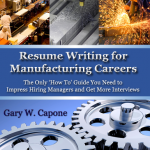I’m helping a retiree find a part time or full time position to supplement his retirement income. He decided he wants to work, and with the drop in the stock market, could use some supplemental income. His search is different from most job seekers. He isn’t looking for a position similar to the job he retired from. That was a VP level position. He’s looking for a much lower level position.
I’m helping a retiree find a part time or full time position to supplement his retirement income. He’s decided he wants to work and with the drop in the stock market, could use some supplemental income. His search is different from most job seekers. He isn’t looking for a position similar to the job he retired from. That was a VP level position. He’s looking for a much lower level position.
The challenge for this candidate is three fold. First, he hasn’t worked in more than five years. Extended gaps in employment can cause a hiring manager to pass on a candidate. It raises a question about the candidate’s commitment and motivation to work. If the candidate does not offer clear value, it can be the deciding factor.
Second, the candidate’s last position was in a senior management role. He is not looking for a similar role. He’s seeking an entry level customer service or administration position. This is a vast departure from his experience. Although he has the skills to do these positions very well, a hiring manager may prefer a candidate coming from a role similar to the job being filled. The concern is that the candidate will not like the job and will quit soon after being hired.
Third, the job seeker’s age will be a factor. Age discrimination is illegal and most companies will not discriminate based on age. Despite this, the candidate is at a stage in his life where he has been retired for five years. He’s looking for supplemental income to make up for stock market declines. A hiring manager may conclude that the candidate would quit as soon as the market rebounds. It really isn’t the age of the job seeker that is the issue – it’s the stage in his life that he’s reached. It can be difficult to tell if the candidate is really serious about returning to work.
These three challenges can sink a job search. They are not insurmountable, though. If the candidate is really serious about finding and staying in a job, he can sell through the challenges. The key is framing the candidate’s skills and abilities in a way that is impressive.
Past Skills
The candidate is proud of a number of high level management skills and accomplishments from his career. These are great, but have nothing to do with the jobs he is pursuing. If he emphasizes the scope of responsibility and size of his accomplishments too much, he may hurt his chances. Even if they aren’t a negative, the accomplishments probably won’t help. A hiring manager is going to assess and hire based on the specific skills required to do a job. For example, Tiger Woods may be the highest skilled golfer in history, but those skills wouldn’t mean a thing if he wanted a Network Administrator, Manufacturing Engineer, or Emergency Room Nurse job. Each of these positions has a completely different skill set.
Relevant Skills
The skills and abilities that are most relevant for a retiree looking for an entry level position to supplement their income relate to the concerns of the hiring manager. Reliability and honesty are significant factors. A commitment to learn and accept feedback are also important. How will this candidate adjust to working for a manager that might be half or even a third of his age? Does he “know it all” or will he strive to learn? The other factor the hiring manager will want to assess is the energy level and motivation of the job seeker. A candidate who really doesn’t want to work is unlikely to be successful over the long term, and will be passed over by hiring managers.
Writing a resume and preparing to interview require addressing the concerns of the hiring manager. That means focusing on reliability, maturity, honesty, quality and a strong work ethic. If you do this, you will give yourself a chance, and a lot of hiring managers will value the experience you bring to the table. If you focus on other skills unrelated to the job, it is unlikely these skills will be valued.
